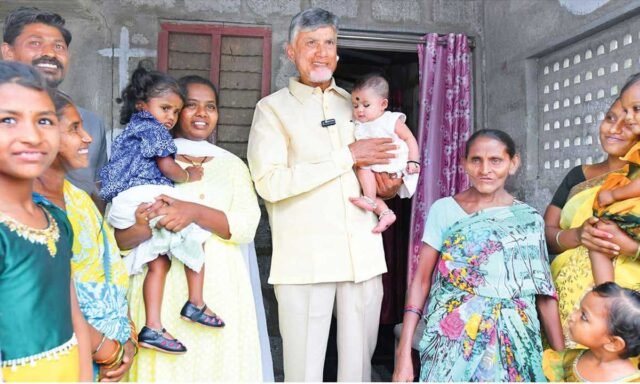Ponnekallu (Guntur): Chief Minister N Chandrababu Naidu on Monday announced the reintroduction of the Ambedkar Overseas Education Scheme, enabling Scheduled Caste (SC) students to once again pursue higher education abroad.
Participating in the Ambedkar Jayanti celebrations at Ponnekallu village in Tadikonda constituency, Naidu reaffirmed his government’s commitment to the upliftment and welfare of Dalits.
Naidu said the Telugu Desam Party (TDP), inspired by the ideals of Dr B R Ambedkar, has consistently prioritised the welfare of marginalised communities. “Ambedkar was a true warrior who fought tirelessly for the rights of Dalits. Our coalition government remains committed to continuing his legacy,” he said.
The Chief Minister announced plans to establish more residential schools to ensure quality education for SC children. He stressed that the state government is focused on holistic development, blending welfare, progress, and good governance. “We aim to provide every household with piped water, free electricity, rooftop solar power, internet access, toilets, and housing,” Naidu stated.
Recalling past achievements, he highlighted that under TDP’s earlier tenure, the party had launched initiatives such as the ‘Mundadugu’ scheme in 2002 and established study centers for SC/ST students. The Ambedkar Overseas Education Scheme had previously enabled economically disadvantaged SC/ST students to study abroad, with SC/ST students receiving up to ₹15 lakh in aid, and BC, EBC, Kapu, and minority students receiving ₹10 lakh. So far, nearly 7,000 students have benefited, with ₹467 crore spent on the programme.
Naidu noted that the TDP introduced the SC Sub-Plan and allocated ₹1,300 crore specifically for SC farmers. Currently, 2.35 lakh students are studying in 1,241 SC welfare hostels, with a total expenditure of ₹1,331 crore.
He also spoke about TDP’s efforts to combat caste-based discrimination.
1 Through Government Order 694, special SC/ST grievance cells were established at district, division, and mandal levels. Officials were directed to visit villages weekly to address caste-related grievances and register atrocity cases. Special courts were also created to expedite these cases.
Highlighting party’s commitment to representation, Naidu pointed out that TDP made history by appointing Dalit leaders such as GMC Balayogi as Lok Sabha Speaker and Pratibha Bharati as Assembly Speaker. He further credited the TDP for playing a pivotal role in conferring the Bharat Ratna on Ambedkar during the National Front government led by N.T. Rama Rao and for installing Ambedkar’s portrait in the Parliament under the NDA regime.
“The progress we see today—with thriving government-private partnerships—stands in stark contrast to the past when there were neither proper roads nor schools. But even as incomes rise, we must work to reduce economic inequality,” Naidu concluded.








